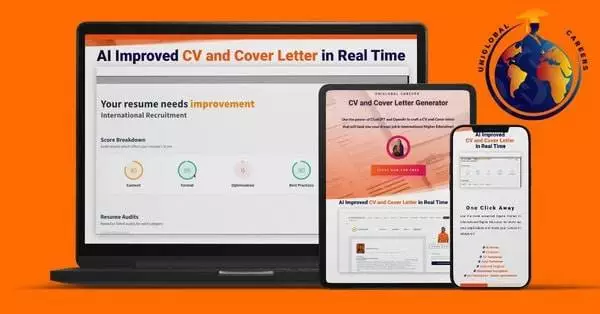If you’re interested in pursuing a career in international education, you may wonder how to stand out from the crowd. One of the most important ways to do so is by crafting a well-written CV and cover letter highlighting your skills and experience in the field. This article will cover some essential tips and strategies for optimising your resume and cover letter for international education job applications.

Crafting a Winning Resume for International Education
Are you looking to make an impact in the field of international education? Crafting a winning resume is the first step towards landing your dream job. With the right approach and attention to detail, you can showcase your skills and experience in a way that sets you apart from the competition.
One of the most important things to keep in mind when crafting your resume is to start with a strong personal statement. This statement should succinctly summarise your experience and demonstrate your passion for working in education. It’s your chance to make a great first impression and grab the attention of potential employers.
When it comes to highlighting your experience, it’s important to focus on relevant roles in education. This could include teaching or administrative positions, as well as any international experience or language skills you have. Be sure to give specific examples of your accomplishments and achievements, using bullet points to make them stand out. For example, you could highlight how you developed new curriculums, implemented successful student support programs, or achieved high student retention rates.
In addition to your experience, it’s important to include any relevant qualifications and certifications. This is particularly important if you’re looking to work in a country where certain qualifications are recognised internationally. Make sure to highlight any certifications you have earned, such as a TEFL or TESOL certificate, and include any relevant training or professional development courses you have completed.
Finally, make sure your resume is well-structured and easy to read. Use clear headings and formatting throughout, and be sure to proofread carefully for any errors or typos. A well-crafted resume can make all the difference when it comes to landing your dream job in international education.
Tailoring Your Cover Letter for International Education
Your cover letter is your chance to make a lasting first impression on potential employers in the field of international education. Crafting a winning cover letter requires careful consideration of the specific role you’re applying for, as well as the organisation you’re hoping to work for. Here are some tips to help you create a cover letter that stands out:
Highlight Your Relevant Experience
Begin your cover letter with a strong opening paragraph that highlights your relevant experience in the field of education. This could include your experience teaching abroad, your proficiency in a foreign language, or your experience working with diverse student populations. Use this opportunity to demonstrate your passion for working in education and your enthusiasm for the role and the organisation.
Do Your Research
Before crafting your cover letter, take the time to research the organisation you’re hoping to work for. Familiarise yourself with their mission and values, and explain how they align with your own goals and values. This will not only demonstrate your knowledge of the organisation, but also show that you’re genuinely interested in working for them.
Showcase Your Skills
When discussing your skills and experience, make sure to highlight those that specifically relate to the role you’re applying for. For example, if you’re applying for a position that involves cross-cultural communication, be sure to discuss your experience working with individuals from diverse backgrounds. If the role involves curriculum development, discuss your experience creating engaging and effective lesson plans. And if community engagement is a key aspect of the role, highlight your experience working with local communities and building relationships with key stakeholders.
Structure Your Cover Letter Effectively
Finally, make sure your cover letter is well-structured and easy to read. Use clear headings and formatting throughout, and ensure that your writing is concise and to the point. A well-structured cover letter will not only make it easier for potential employers to read and understand, but also demonstrate your attention to detail and professionalism.
By following these tips and tailoring your cover letter to the specific role and organisation you’re applying for, you’ll be well on your way to landing your dream job in international education!

Highlighting Strengths and Achievements for International Education
International education is a field that requires a unique set of skills and experiences. To stand out in this competitive industry, it’s important to highlight your strengths and achievements in a way that demonstrates your impact on students and the wider community. Here are some tips to help you showcase your strengths and achievements:
- Focus on results and outcomes: When highlighting your strengths and achievements, it’s important to focus on the impact of your work on student outcomes, engagement, and satisfaction. For example, if you were a teacher, you could talk about how your students consistently scored higher on standardized tests or how they were more engaged in class after implementing a new teaching strategy.
- Use specific examples: Sharing stories about times when you’ve been able to make a difference or go above and beyond in your role can help demonstrate your strengths and achievements. For example, you could talk about how you helped a struggling student improve their grades or how you organized a successful study abroad program that had a positive impact on the students who participated.
- Showcase your problem-solving skills: International education roles often require a lot of flexibility and creativity, so highlighting times when you’ve been able to think outside the box to solve problems can be a great way to showcase your strengths. For example, you could talk about how you came up with a creative solution to a logistical problem that allowed a study abroad program to run smoothly or how you were able to adapt your teaching style to better meet the needs of a diverse group of students.
By following these tips, you can create a compelling narrative that highlights your strengths and achievements in international education. Remember to be specific, focus on outcomes, and showcase your problem-solving skills to make your application stand out from the crowd.
Making the Most of International Education Interviews
The interview is a crucial step in securing a job in international education. It is an opportunity for you to showcase your experience, skills, and enthusiasm for the role.
However, the interview process can be daunting, especially if you’re not sure what to expect. Here are some tips to help you make the most of your international education interviews:
- Research the organisation and the role – Before your interview, take the time to research the organisation and the role you’re applying for. This will help you understand the organisation’s mission, values, and goals, and prepare you to answer questions about why you’re interested in the role.
- Prepare examples – Prepare examples of how you’ve demonstrated the skills and experience required for the role. This will help you provide concrete evidence of your abilities and show that you’re a good fit for the position.
- Show your enthusiasm – Be prepared to show your enthusiasm for the role and the organisation. Explain why you’re passionate about working in international education specifically, and how your skills and experience align with the organisation’s values and mission.
- Highlight your cross-cultural communication skills – International education involves working with diverse student populations from all over the world. Be prepared to talk about your cross-cultural communication skills and how you’ve successfully worked with students from different backgrounds.
- Prepare for language-specific questions or tests – If the role requires proficiency in a specific language, make sure you’re well-prepared for any language-specific questions or tests. This will demonstrate your language skills and show that you’re committed to the role.
Remember, the interview is your chance to make a strong impression and show that you’re the best candidate for the job. By following these tips, you’ll be well-prepared to showcase your skills and enthusiasm for international education.Using UniGlobal’s AI powered CV and Cover Letter Generator.

If you’re struggling to write a CV or cover letter from scratch, why not try UniGlobal’s AI-powered CV and cover letter generator? Simply input your information and desired role, and the generator will provide you with a customised CV and cover letter. While it’s not a substitute for a well-written application explicitly tailored to the role, it can be a helpful starting point for international education job applications.
Final thoughts
Optimising your CV and cover letter for international education roles can be challenging, but it’s an essential step towards securing your dream job in the field. You can maximise your chances of success by showcasing your passion, experience, and achievements in a way that’s specific to the role and organisation. With these tips and strategies, you’ll be well on your way to crafting a winning application for international education roles.


